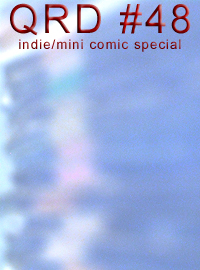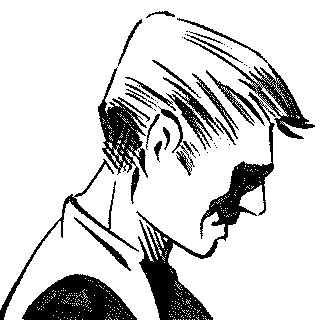









February 2011

City: San Diego, California
Comics: Marked, Ultimate Lost Kisses
Websites: www.jsqred.blogspot.com
QRD – How old were you when you first got into comics & did you always stick with them or did you come back to them?
Jeremy – I started to draw with ambitions to be a pro at the age of 15. It was Spring Break & I had checked out “How to Draw the Marvel Way.” I spent all week trying to duplicate John Buscema’s Doc Doom.
QRD – What was the first comic book you ever bought?
Jeremy – I was probably about 4 or 5 & it was a Spider-Man special. I might have gotten it from a doctor’s office. I think it had the Green Goblin in it.
QRD – How old were you when you put out your first comic?
Jeremy – 32.
QRD – What decade do you think produced the best comics?
Jeremy – The 40s, that’s when my favorite icons were just getting started.
QRD – Why comics instead of just writing or drawing?
Jeremy – I was always fascinated with them & animation as a kid, also I have no desire to create any other kind of art professionally.
QRD – Do you see mini-comics & indie comics as paths to mainstream comics or as their own unique media?
Jeremy – I see them as a unique media for me.
QRD – How many copies of your comic do you print in your first run?
Jeremy – Ideally I would like to print 1500 if I am making a B/W book & 2000 if it’s color.
QRD – How much do you think comics should cost?
Jeremy – I think the formula should account for production cost & then from there as a percentage for all contributors. So say a book cost $0.80 to print & you have 3 people who put it together then the cost should be increased 10% of production cost for each participant. The $0.80 book would end up costing about $1.04. The idea is to put the book in people’s hands, not necessarily make a fortune on your first run.
QRD – How many books do you produce a year & how many would you like to?
Jeremy – So far I think it’s about one a year. I would like to do six a year.
QRD – Do you think stories should be serialized or delivered as complete works?
Jeremy – Initially a book should be a complete work, with the possibility to be serialized.
QRD – How are comic strips different than comic books & which medium do you prefer?
Jeremy – Strips seem to have the need to tell part of the story in a very short amount time & make the reader want to come back whereas a comic book can lead up to a suspenseful climax & leave you wanting more. I’ve thought about doing a comic strip, but the funny kind. I prefer the comic book format because I can draw more.
QRD – How long is it from when you start a comic until it’s printed?
Jeremy – Approximately six months.
QRD – What do you do better with your comics now than when you first started?
Jeremy – Two areas I’m always striving to improve on is anatomy & composition. I think I’ve improved in both these areas since I’ve come back to comic book art.
QRD – At what point in the artistic process do you work digitally?
Jeremy – When I’m scanning it for delivery, seriously.
QRD – What do you think of digital comics & webcomics?
Jeremy – I think it’s the way the print industry is going.
QRD – Do you prefer working in color or black & white?
Jeremy – I’ve never made a color book, but I would like to see my work in color. I do like B/W so I might experiment with color then return to a B/W format.
QRD – How many different people should work on a comic & what should their jobs be?
Jeremy – The absolute minimum needed to complete the book. For me it’s probably two or three at the most. I like to pencil, ink, & letter so I would need a writer & maybe an editor.
QRD – How do you find collaborators?
Jeremy – I randomly stop strangers in public places. Just kidding, I’ve found most online through message boards.
QRD – How tight do you think a script should be as far as telling the artist what to draw?
Jeremy – Loose. So loose that the artist almost has to complete the script with the art. If that makes sense.
QRD – What comic book person would you be most flattered to be compared to?
Jeremy – I can’t think of anyone really.
QRD – What do your friends & family think of your comics?
Jeremy – I think there’s some mixed feelings about the whole thing that would come to light if I was to make it big.
QRD – What do you think of superheroes?
Jeremy – I think they are what we aspire to be.
QRD – Marvel or DC?
Jeremy – Dee See.
QRD – What comic characters other than your own would you like to work with?
Jeremy – The World’s Greatest Detective.
QRD – Ideally would you self-publish?
Jeremy – Absolutely.
QRD – What conventions do you try to attend & why?
Jeremy – I plan to attend SDCC 2011 & APE this year. SDCC because I live here & want to go to it at least once, then I might skip out on it after that & just stay home & draw those days. I want to attend APE to see what that’s like. If it’s like the comic book conventions I remember as a kid then I might make a habit of attending it every year.
QRD – What do you do to promote your books?
Jeremy – Give ’em away!
QRD – Do you think your comics are well suited to comic shops or would sell better elsewhere?
Jeremy – I think someone should have a kiosk or small table at bus stops, train stations, airports, college campuses, supermarkets.…
QRD – What other medium would you like to see some of your comics made into (television, film, games, action figures, etc.)?
Jeremy – I would like to see them printed on the back of cereal boxes & any other packaging the general public might see them.
QRD – Do you consider yourself a comic collector or a comic reader or both?
Jeremy – I’m just a casual reader now. When I was younger I was a collector. I remember I was working on the X-Men from 94 to about 121. Anything I buy now is usually reprints. I want to buy the whole Marvel edition of the Transformers comic.
QRD – What do you see as the most viable mediums for comics distribution 10 years from now?
Jeremy – Apps.
QRD – What would you like to see more people doing with comics?
Jeremy – Focus more on good storytelling & not be so concerned about making it big or catering to what is perceived to be market demand.
QRD – Anything else?
Jeremy – I try to avoid the “too cool for
school” mentality with anything I set out to do & comics for me was/is
a medium which allows me to get as crazy, strange, & creative as I
want to. Whether it’s a handful of people or the comic book buying public
I aim to deliver my best & I appreciate anyone taking the time to give
me a chance.







